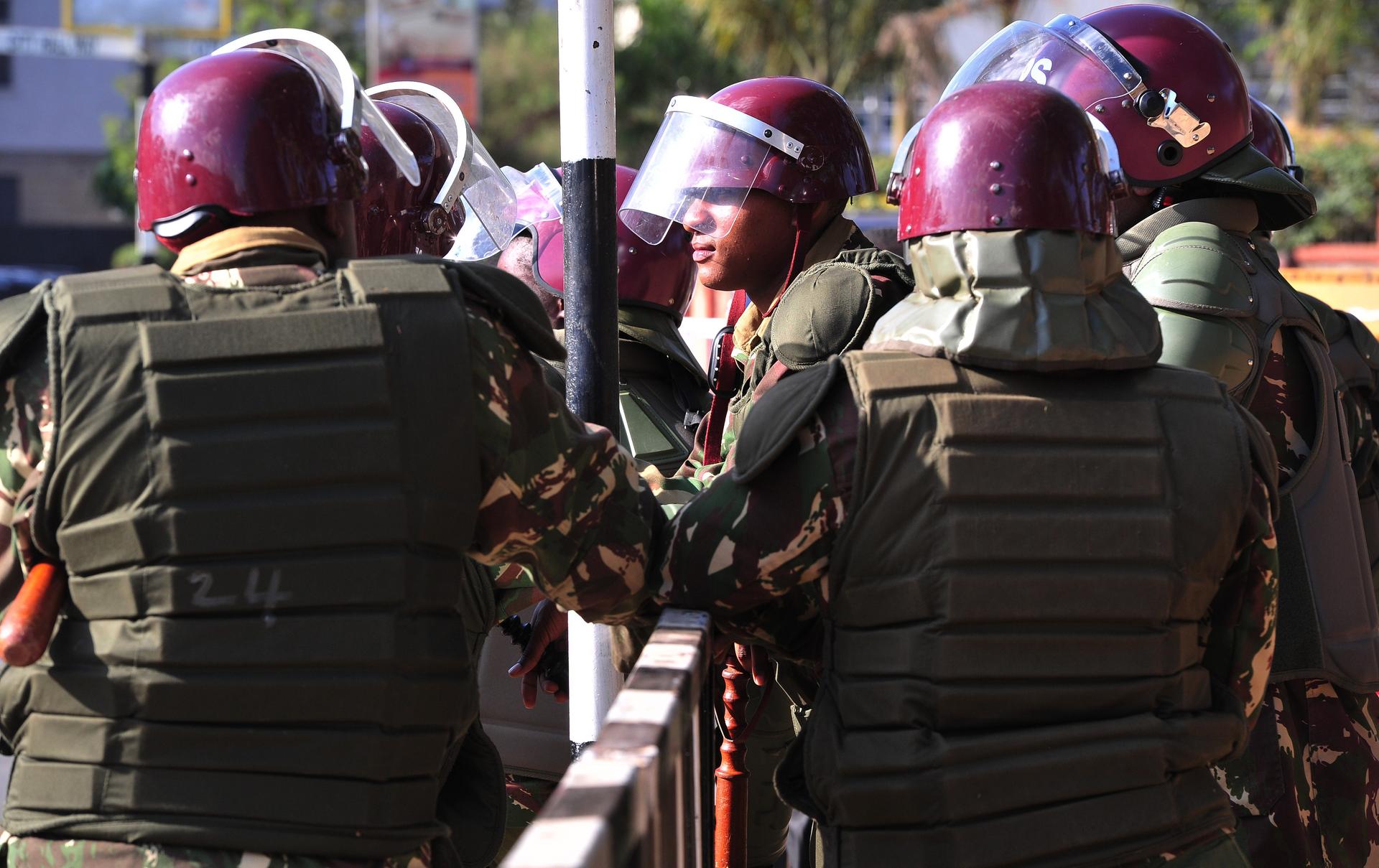Muslim leaders are trying to change the way Kenya fights terrorism
Kenyan policemen stand guard near the parliament during debate on controversial new security legislation proposed after a string of attacks in Kenya by Somalia-based Al Shabaab insurgents. Pressure is on the government to find a way to confront the Islamist militants.
NAIROBI, Kenya — Muslim leaders have called on the Kenyan government to stop victimizing innocent Muslims as part of anti-terror efforts and instead engage with the Muslim community to address extremism.
Al Haji Yusuf Murigu, the vice chairman of National Muslim Leaders Forum, spoke on behalf of Muslim leaders last month, asking the government to keep police and military from acting above the law in combating threats from the Islamic militant group Al Shabaab and other extremist groups.
“While we support the government’s measures to weed out terrorism, we are concerned that the measures being taken are selective and often deliberately target members of the Muslim community,” Murigu said.
On his recent trip to Kenya, US President Barack Obama praised the Kenyan government for its cooperation in counterterrorism efforts. However its anti-terror strategy has been criticized by human rights activists for targeting the minority Muslim population with arbitrary detention and sometimes murder by the police. The strategy of punishing a larger group for the actions of a few is known as "collective punishment."
A Human Rights Watch report confirmed in June that a police effort to strangle the power of Islamic militants has conversely targeted innocent civilians, resulting in extrajudicial killings and a counterproductive rise in extremism. The Anti-Terrorism Police Unit (ATPU), a section of Kenya’s Criminal Investigation Division, has been accused of these tortures, disappearances and killings of terror suspects.
Mustafa Ali, a conflict resolution expert with Building Resilience Against Violent Extremism (BRAVE) Initiative, an organization which focuses on countering the use of Islam to legitimize violence, says that they have been advising the government not to focus their efforts too much on military — or “hard” — approaches to extremism.
“When you are dealing with radicalization, especially that which might lead to violent extremism, you have to convince these young people that the path they are on is wrong. We deal with it through counseling and psychosocial support. Addressing their conditions has to be done and government has to play their part in addressing those push factors that are pushing these young people into violent extremism,” said Mustafa.
Muslim leaders, through organizations like Supreme Council of Kenya Muslims (SUPKEM), Center for Ihsan and Educational Development (CIED), and BRAVE have come up with programs to offset militant ideology. By doing so, they hope the government will partner with them.
For the two months, BRAVE has been running campaigns on media and social media platforms with anti-extremism messages.
“They are paid advertisements that are carefully produced to actually address the issue of violent extremism to delegitimize the groups that are misusing Islam to propagate their murderous ideology,” said Mustafa.
Sheikh Hassan Omari, the Director of Religious Studies at SUPKEM and consultant at CIED says that Muslim leaders have done a lot in countering violent extremism through various programs.
“We have started teaching Muslims interfaith dialogue and effects of terrorism. We organize group activities that allow participants to explore all value positions on issues central to extremist discourse and relevant to events in Kenya, free from criticism or social pressure,” he said. Sheikh Hassan, who is also a professor of Islamic religion at the University of Nairobi, added that in the forums that they hold allow participants to suggest interventions to solve terrorism-related topics according to a broad array of their own values.
Sheikh Hassan travels the country preaching counter-narratives and he says that these forums are mostly held during Friday khutbahs, or prayers. According to Hassan, the government has not worked with SUPKEM despite their advocacy work and proposals.
He believes that if the government worked with SUPKEM or any other Muslim organization it would cost very little and could resolve a great issue.
The Council of Imams and Preachers of Kenya (CIPK) is doing its part to ward off radical ideology through its vast network of Muslim clerics across the country and regular training of its members. Abdalla Ateka, the National Chairman of CIPK said that they have called on Imams and preachers across the country to protect their mosques from being used by extremist preachers and to include the youth in their mosque committees.
Ateka wishes the government would partner with the Muslim community instead of using brutal force. He believes that such force is counterproductive and sabotages the work they are doing in trying to sell narratives to combat terrorism.
“We want to do away with radicalization as it does not reflect true Islam,” said Ateka.
This is the third in a series of articles on police corruption and brutality in Kenya by The GroundTruth Project with support from the Galloway Family Foundation. Read the first article, "Kenya's anti-terror police inflict terror of their own," here. Read the second, "When Kenya kills," here.
This story was presented by The GroundTruth Project.
Our coverage reaches millions each week, but only a small fraction of listeners contribute to sustain our program. We still need 224 more people to donate $100 or $10/monthly to unlock our $67,000 match. Will you help us get there today?
